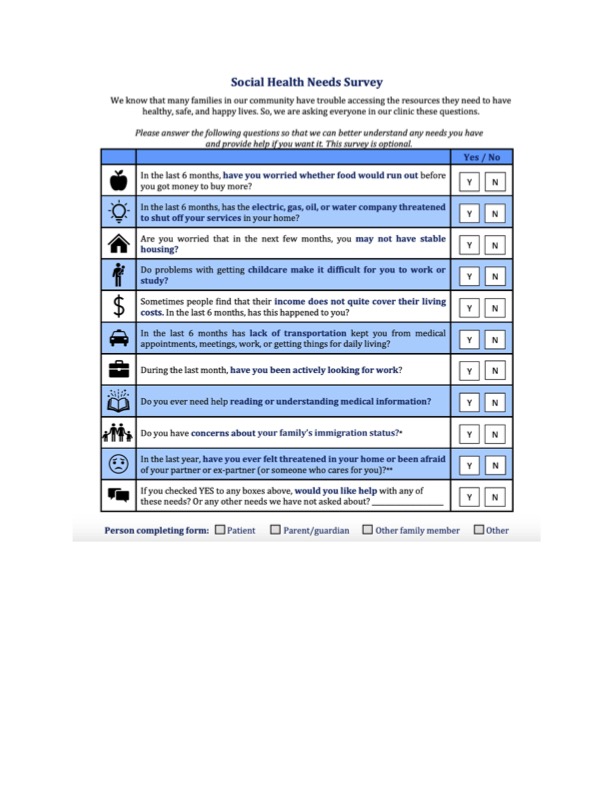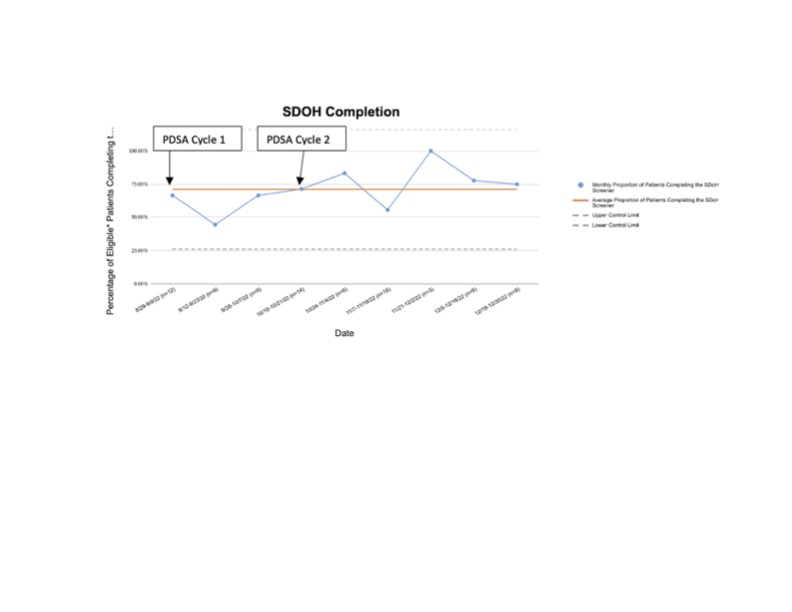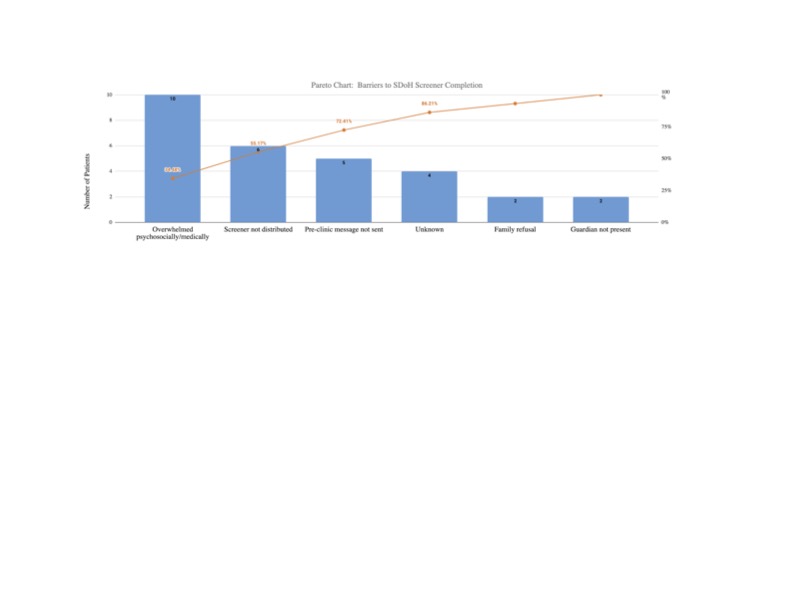Session Information
Session Type: Poster Session B
Session Time: 5:00PM-6:00PM
Background/Purpose: Adolescents with chronic disease often struggle with the transition from pediatric to adult healthcare leading to poor follow-up and negative health outcomes. Social determinants of health (SDoH) such as income, food insecurity, and immigration status likely have a significant impact on transition success. This study aims to successfully implement a standardized approach to SDoH screening and proactive social work involvement for pediatric rheumatology patients.
Methods: An interprofessional team was created to proactively identify psychosocial barriers to successful transition from pediatric to adult care in an outpatient pediatric rheumatology clinic. Eligibility criteria included established patients, age 14 or older, with chronic rheumatic disease, present with a legal guardian. The SDoH screener, adapted from the Health Leads Screening Toolkit, was given to eligible patients every 6 months (Figure 1). The primary outcome was the percent of eligible patients who completed the SDoH screener, and the secondary outcome was the percent of positive screens who met in-person or via phone with the clinic’s social worker. A daily secure message was sent to providers and medical assistants to confirm family suitability for receiving the SDoH screener. Upon checking-in, eligible patients’ guardians were given the screener and a cover sheet explaining its purpose. Medical assistants collected the screeners and promptly shared results with the provider and social worker in the original text thread. Families with positive screens, defined as one or more “yes” responses, were asked if they would like to meet with the social worker. The SDoH screener was integrated into the clinic in August 2022. At the end of August, a meeting was held to reeducate staff about the SDoH screening process flow (Plan-Do-Study-Act (PDSA) cycle 1). In October 2022, the workflow was modified to include patients seen in the infusion center (PDSA cycle 2).
Results: Preliminary results were collected August through December, 2022. On average, 71% of eligible patients completed the SDoH screener each month (Figure 2). Of those completed (n = 59), 15% (n = 9) of patients screened positive. 89% of patients with a positive screen directly interfaced with social work at the time of their visit or via phone shortly thereafter. Identified barriers to completion of the SDoH screener include families feeling psychosocially/medically overwhelmed, staff forgetting to disseminate the SDoH, and the morning message not being sent before family arrival (Figure 3).
Conclusion: Implementation of a standardized SDoH screener was successful through interdisciplinary teamwork and communication. This has led to identification of potential barriers to care and proactive integration of social work support for the adolescent rheumatology patients. Next steps include collecting patient-facing feedback regarding SDoH screening acceptability and collection procedures, analysis of the correlation between SDoH screener results and transition outcomes and implementation of further PDSA cycles to address barriers to integration of SDoH screeners into clinic workflow.
 This figure shows the screener used to screen for social determinants of health in the pediatric Rheumatology clinic.
This figure shows the screener used to screen for social determinants of health in the pediatric Rheumatology clinic.
 This figure shows the rate of completion of social determinants of health screeners from August 2022 to December 2022. The initiation of different PDSA cycles are indicated.
This figure shows the rate of completion of social determinants of health screeners from August 2022 to December 2022. The initiation of different PDSA cycles are indicated.
 This figure shows the rate of different barriers that prevented the completion of the social determinants of health screener.
This figure shows the rate of different barriers that prevented the completion of the social determinants of health screener.
To cite this abstract in AMA style:
Campbell S, Peterson R, Barrientos S, Benett E, Christenholz C. An Interdisciplinary Team Approach to Implementation of a Social Determinants of Health Screener for Pediatric Rheumatology Patients [abstract]. Arthritis Rheumatol. 2023; 75 (suppl 4). https://acrabstracts.org/abstract/an-interdisciplinary-team-approach-to-implementation-of-a-social-determinants-of-health-screener-for-pediatric-rheumatology-patients/. Accessed .« Back to 2023 Pediatric Rheumatology Symposium
ACR Meeting Abstracts - https://acrabstracts.org/abstract/an-interdisciplinary-team-approach-to-implementation-of-a-social-determinants-of-health-screener-for-pediatric-rheumatology-patients/
